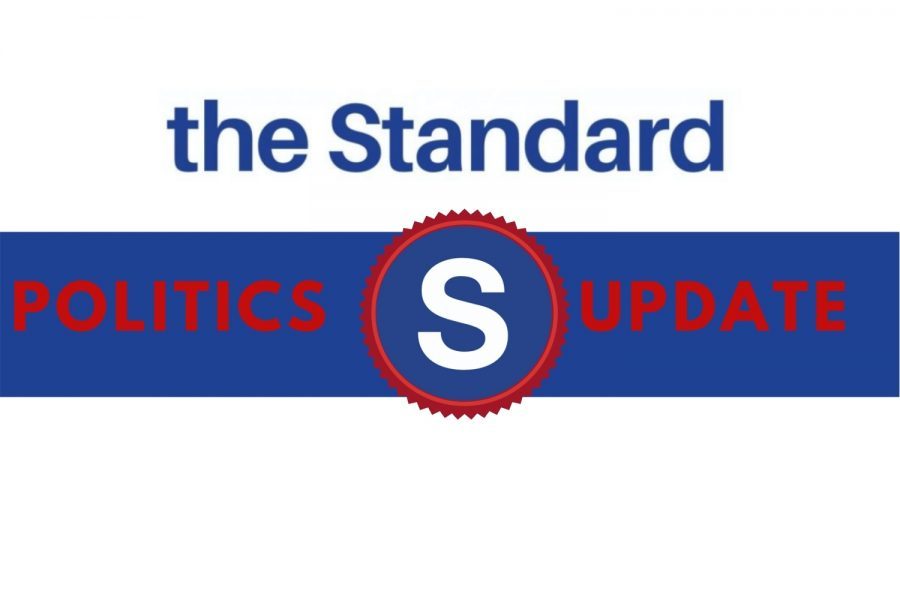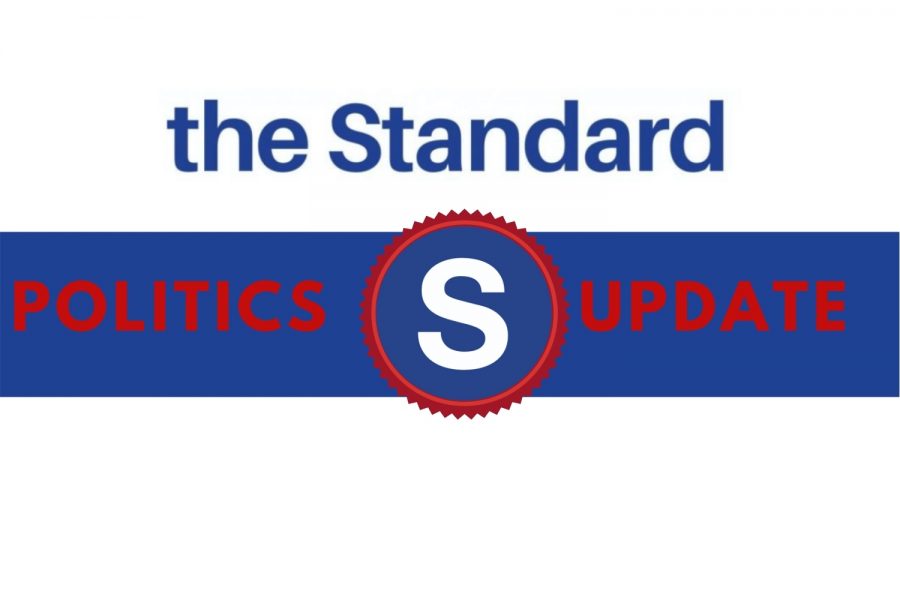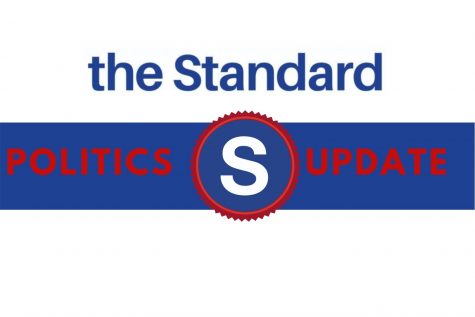A troubling Trump response
Delivering a speech in the West Wing of the White House Nov. 4, as supporters wildly clapped him on and his children smiled phonily, U.S. President Trump declared himself the victor of the presidential election – falsely.
Trump’s election night victory speech seemed increasingly premature (even though most knew it already was) as his lead dwindled throughout the week. When various media outlets, including his beloved Fox News, projected President-elect Joe Biden as the winner of the election Nov. 7, it’s safe to say Trump threw a hissy fit, refusing to concede.
Trump and his legal team have, as expected, been launching lawsuits in many states to throw out votes on the basis of fraud, for which they have presented no evidence. And if evidence has been produced in court, none of it has been shown to the public. Further, the courts clearly don’t consider whatever they are producing damning either as they have been throwing these cases out left and right.
Even if successful, these cases are highly unlikely to change the outcome of the election; they individually consider approximately 100 votes in states where Biden’s lead is over 10,000 votes. So, more than anything, these lawsuits seem a PR facade, only drumming uncertainty into the election process. Even worse, fellow Republican legislators are allowing Trump to disparage U.S. democracy while avid Trumpers eat it up.
The upside for Biden supporters, and for that matter supporters of democracy, is that Trump’s litigation efforts have stalled everywhere. Not only do these court decisions present a direct defeat to Trump himself, but they secure faith in the U.S.’ election system for everyone else.
Attacks on the free press and violent crackdowns on protestors exercising their right to free assembly aside, Trump’s presidency could still be characterized as the closest to a dictatorship the U.S. has ever gotten.
The president’s current behavior is barely short of authoritarian. Attacks on the free press and violent crackdowns on protestors exercising their right to free assembly aside, Trump’s presidency could still be characterized as the closest to a dictatorship the U.S. has ever gotten.
If Joseph Stalin, Mao Zedong and Fidel Castro wrote an authoritarian playbook, Trump would be the quarterback executing it. Well, taking into account his athletic prowess, maybe water boy would be more accurate, but for the sake of analogy. Luckily, Trump won’t have time to get to the really nasty pages of such a playbook.
Refusal of the truth is a hallmark of any descent into dictatorship. While assuming such a collapse is imminent may be hyperbolic, most every dictator began as your typical populist spewing the same falsehoods Trump is right now.
Because Trump sticks out like a sore thumb in the history of U.S. presidents, much of his shady behavior is excused as a continuation of his everyday eccentricity. At this point, Trump spreading misinformation on Twitter is a given, but this new low cannot be treated with the same negligence.
Democracy is working the way it is supposed to, and yet Trump has signaled it is the hill upon which he wants to die. When the tear gas in front of the White House settles, Trump’s legacy will be determined by his defamation of long-heralded U.S. democratic principles.
The future of the donkeys
Differences in approach within a party are natural, but in the Democratic Party in the U.S., these differences are far more drastic. The party struggles to umbrella the wide range of ideology it represents, which has been accentuated by the rise of a popular progressive movement over the past few years. Rep. Alexandria Ocasio-Cortez, a member of “the squad,” four congresswomen considered the pioneers of said movement, has said that in any other country, herself and President-elect Joe Biden would not even represent the same political party.
Though the party won the White House, it didn’t achieve the congressional majorities it so craved. The donkeys hoped to solidify and expand the House caucus and take back control of the Senate. They failed to achieve both goals, and in doing so spent hundreds of millions of dollars in the process. Moderates who won most of the 40-odd house seats in 2018 were the first to lose.
Progressives, especially in the House, will feel that having control of the White House means the party has a mandate to carry out more radical proposals in the next four years.
These disgruntled former representatives pointed fingers at Ocasio-Cortez and the progressive caucus, citing efforts to defund the police and talk of socialist policies which the group advocate for as the cause of their losses. She shot back, claiming their lack of spending on social media advertising lost them close races.
Potential splits in the party pose grave dangers, considering the narrow House majority the democrats hold. If even small numbers of progressive representatives are dissuaded and dissent against the party, it could be catastrophic for Democratic hopes of passing major legislation. The re-election of Speaker of the House Nancy Pelosi could be another point of contention, as progressives and moderates alike feel the lifelong politician should step aside for a younger member.
The extent to which the president-elect will be able to work and legislate in this environment is unclear. Biden is very much a status quo kind of guy, but the squad are not status quo kind of legislators. While some of Biden’s campaign proposals hint at a shift from the status quo, it’s a more incremental shift than the progressive wing would care for. Progressives, especially in the House, will feel that having control of the White House means the party has a mandate to carry out more radical proposals in the next four years.
Much of this infighting is hypothetical, but plausible. For the time being, the party deserves to collectively celebrate its victory in the presidential election as well as reflect upon its defeat in the congressional election. But fighting a common enemy in Trump may have been the only thing keeping the stitches of the party together. Now that their patchworker is gone, the party could fall apart at the seams.
Vaccine gives Boris political hope
Prime Minister Boris Johnson has failed to adequately contain COVID-19. The lockdown measures under which we are living serve as no better evidence. However, the promising news of a vaccine may award him a second chance at success.
Pfizer, a major pharmaceutical company contracted by the U.S. to create a vaccine, released news that its product was more than 90% effective at combating the virus within the human body. Governments and individuals alike took notice. The company’s stock led a surge on Wall Street, shooting up 13% Nov. 9. The Dow Jones Industrial Average, a major stock index, also followed suit and increased its price by 2.95%. However, the political fortunes of Johnson may have been the biggest winner of the announcement.
As pharmaceutical companies like Pfizer announced their intentions to produce a vaccine for COVID-19, the U.K. government was quick to secure large numbers of pre-orders from each of the manufacturers that showed promise. Somewhere between 340 and 380 million doses have been secured, split between six manufacturing candidates. 30 million of those doses are to come from Pfizer.
This pre-order scheme taken up by the U.K. is similar to those established by the U.S. and Japan. They each purchased a combined total of 1.3 billion doses. However, while the E.U. did manage to secure purchases of 700 million doses of a vaccine, they chose not to spread their commitments across the six major companies. Rather, they only acquired vaccine candidates from two companies, neither of which were Pfizer. The E.U. only purchased Pfizer’s vaccine two days ago, while The U.K did so in July.
This means that the U.K. will likely be the first country in Europe to have a vaccine in hand, and one with a reported high level of effectiveness. While continental states brace for an isolated holiday season to close out 2020, the U.K. will begin to receive 10 million doses of Pfizer’s vaccine mid-December, if current projections are to be trusted. Whether or not Johnson can master the logistical feat of receiving the vaccine and getting it into people’s arms is still an open question.
There’s also the fact that this vaccine is picky; it’s shipped in doses of 1,000, and to be effective it must be kept at temperatures of -80 degrees celsius and used within 24 hours. These variables alone will make it difficult for the U.K. and other governments to solve the logistical challenges the vaccine presents. However, if Johnson succeeds, it will reward him with the political capital that his failure to contain COVID-19 has chipped away.










Peggy Elhadj • Nov 14, 2020 at 11:48 am
Wow! This article tells you everything you need to know about politics. I especially enjoyed the paragraph about the authoritarian playbook (Trump as waterboy!)!